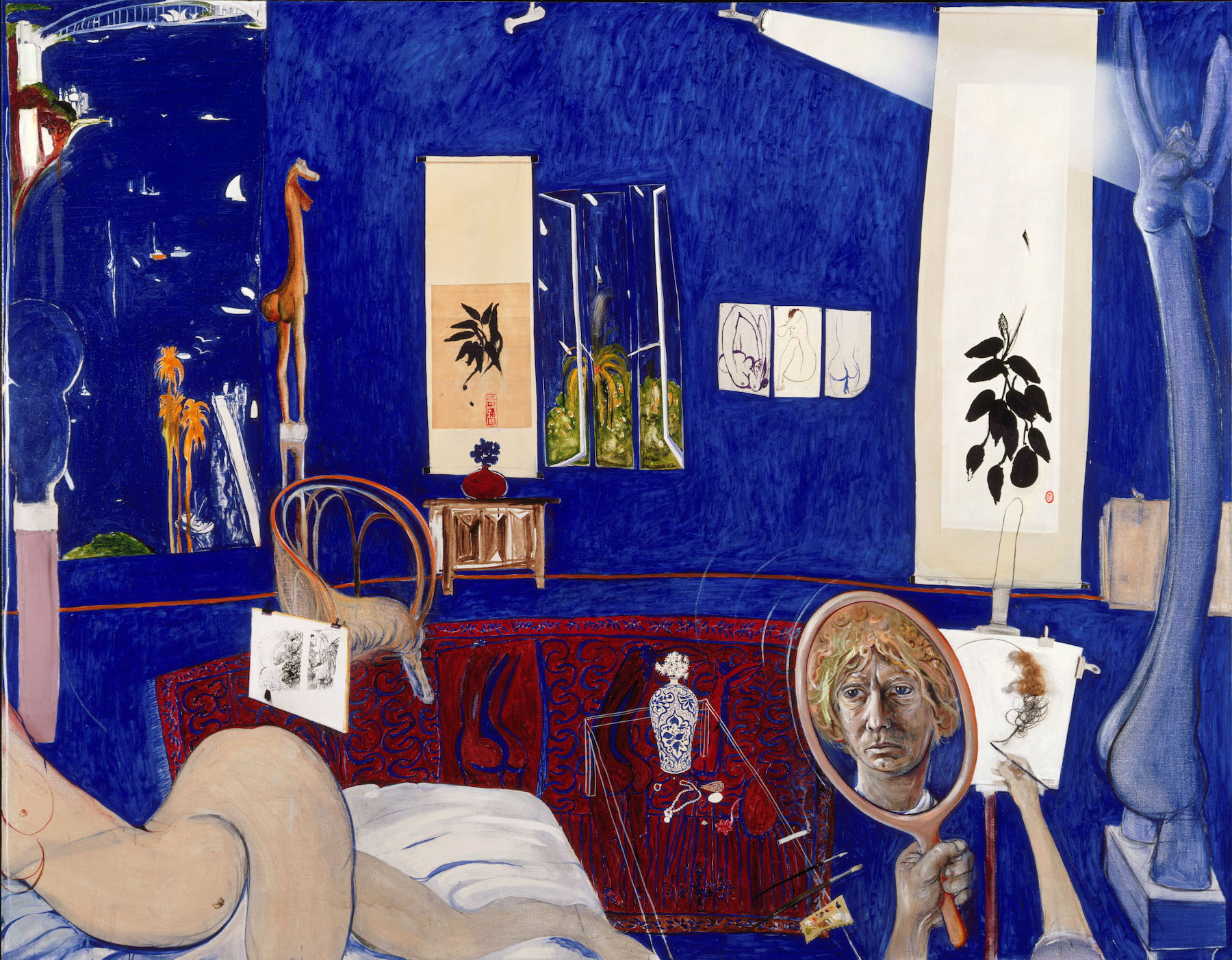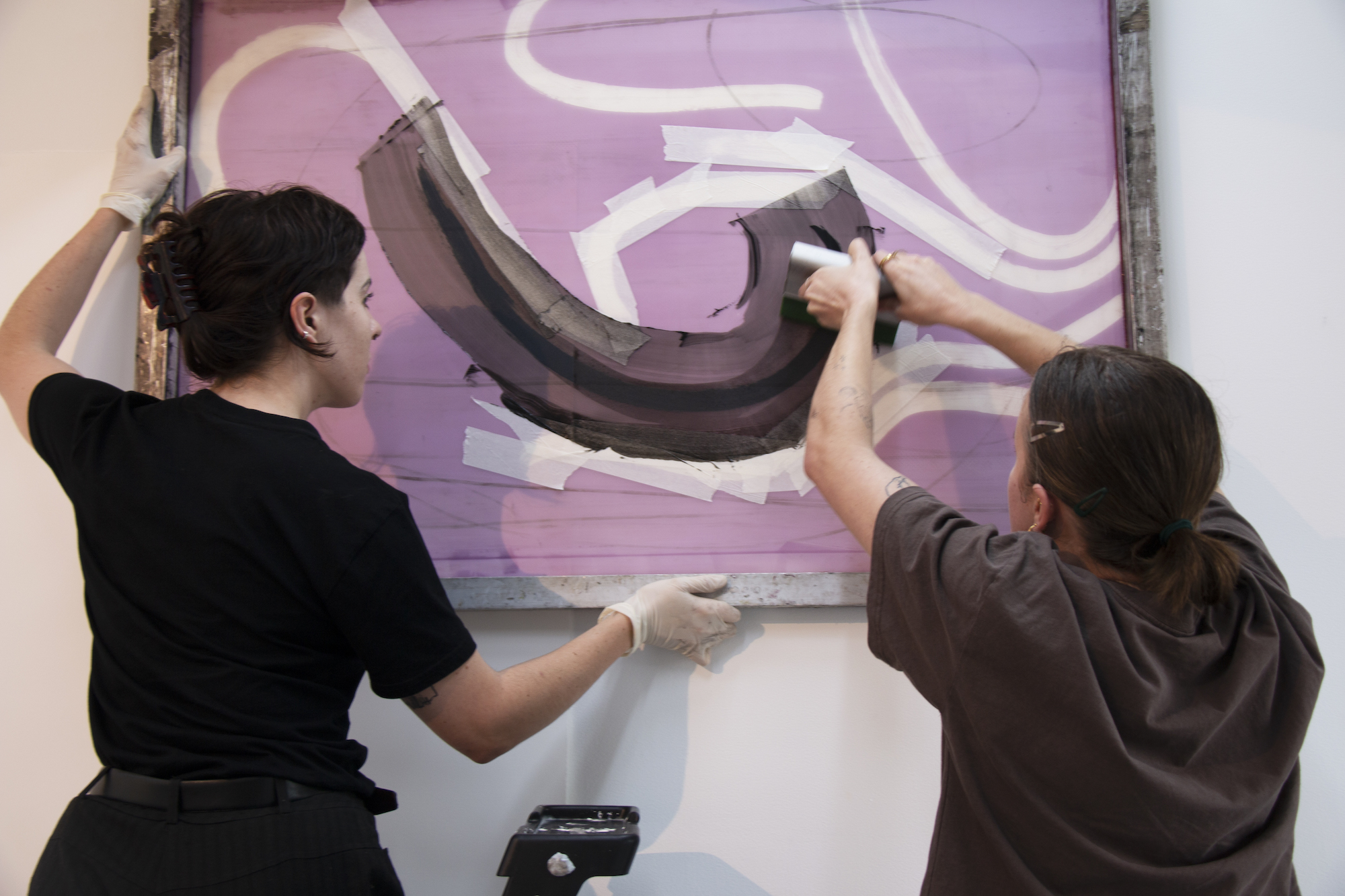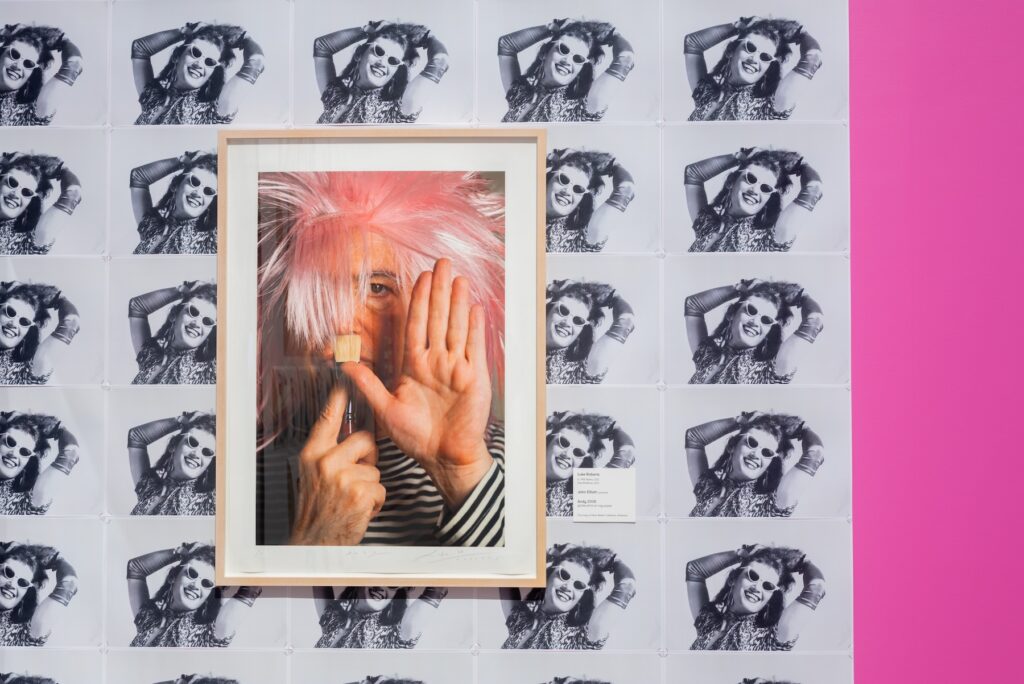
There is a particularly vicious alienation that occurs when a group uses the language of inclusivity to betray the marginalised. Luke Roberts has experienced this betrayal in the past and the retrospective exhibition of his career portrays that psychodrama. Curator Nicholas Tsoutas describes the recent exhibition at the Rockhampton Museum of Art, Beyond the Great Divide as a “metaphor for liberation”1 that interrogates the things that “divide us into socially definable categories.”2 Yet the exhibition did not live up to those lofty claims. Instead, it revealed a deep discomfort within the art world with transfemininity that doesn’t go back in the closet when it comes off the stage.
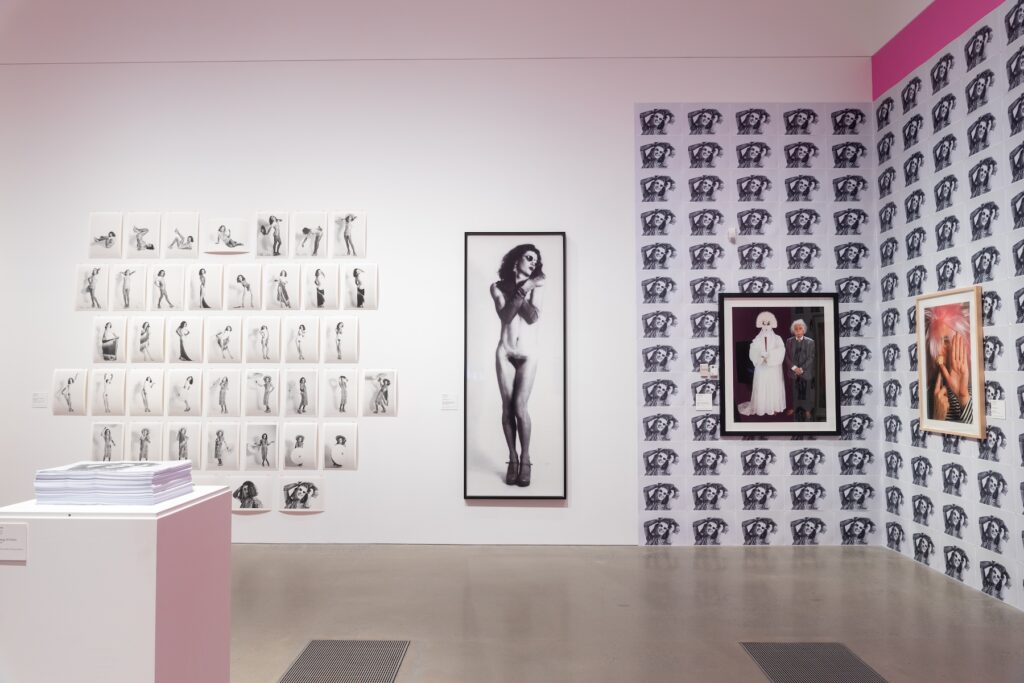
The evening of the exhibition opening, We came across a set of artworks that struck Us with a moment of dread, like a visual slur. Alice Jitterbug: Transformer (1977-2024) is a series of pinup shots of the artist in various states of nudity. In the largest work, Alice Jitterbug (Transformer) (Full Length #2) (1976-2003), the artist is completely naked (and tucking) except for shoes, long velvet gloves, sunglasses, and earrings. Another of the photographs is replicated in Alice Jitterbug (1977/2024). Here, photocopies of a glamour closeup rest on a plinth, reminiscent of a stack of newspapers. This display method conveys the message that this imagery is a spectacle to be consumed, but the stack remained almost entirely untouched. Roberts has spoken of his fondness for British drag as well as the “demi-monde”3 character—bringing to mind Andy Warhol’s “chicks with dicks.”4 The consumerism of Warhol’s aesthetic is also a prominent influence in the Alice Jitterbug artworks.
A divide between professional drag performers and street queens who lived daily life as women was forged in the early 1970s—within four years of the Stonewall uprising—when the gay liberation movement discarded street queens in a bargain for normality.5 This was apparent at the time, as noted by the Transvestite, Transsexual and Drag Queen group of the Gay Liberation Front in 1971 when they asked: “Why is Danny La Rue a West End institution, when we get kicked out of our flats for wearing a skirt? Apparently it’s all right if you’re doing it for money, but perverted if you do it for personal satisfaction.”6 While Roberts may have brought drag to the art world in Australia, he did so in the wake of this divide, securing a place in the upper class echelons of the cis-normative queer divide.
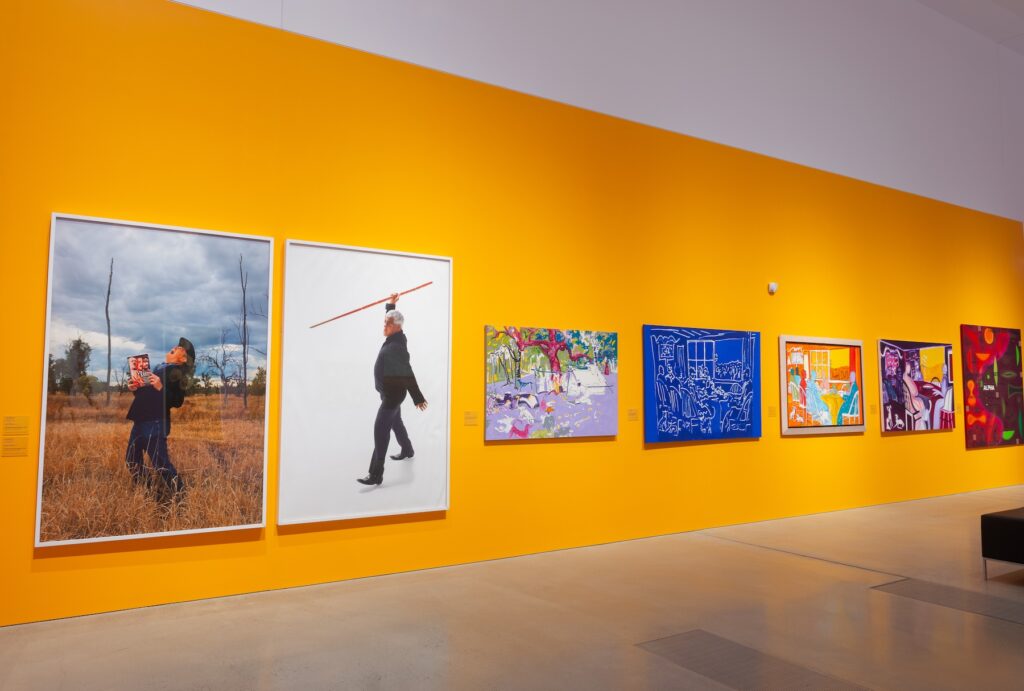
A surprising number of bigoted tropes that arise in artworks by Roberts go unchallenged by the exhibition and its curator. The Spearing (2009) is a naive inversion of the power dynamics and violence of colonialism. The first photograph of this diptych depicts Roberts in the countryside, arching his back with a look of pain on his face. In the second photograph, Richard Bell stands in a suit in a featureless white environment, throwing a spear towards Roberts’ back. After the 2004 Palm Island Uprising, police whipped themselves into a frenzy: spears frequently recounted by police as being present during the uprising were found to have been imaginary.7 By attempting the inversion in this way, Roberts reiterates instead of unravelling that racist image of Indigenous people as the cause of interracial violence.
Similarly, a quote frequently misattributed to Voltaire but actually paraphrased from the words of Neo-Nazi Kevin Strom appears among Pope Alice 40th Anniversary Postcards (The National 2019) (2019/23). It reads: “To learn who rules over you, simply find out who you are not allowed to criticize.” In the full context of that quote, the self-identified anti-Semite Strom claims that Jewish people rule the world by infiltrating powerful institutions.
On the same section of wall, The Amazing Pope Alice (2022–24) takes the form of a comic book. The cover employs the reptilian conspiracy theory popularised by David Icke, wherein reptilian aliens have infiltrated Earth’s leadership positions. This is another iteration of the same anti-Semitic trope, with reptilians as placeholder for Jewish people. Text on the cover of Roberts’ work reads “Half-man… half-reptile… The Lizard will take over all of Earth unless Pope Alice alone can stop him!” Icke’s work has had a significant influence on Roberts, as revealed in interviews throughout the exhibition and sources he cites in the catalogue.8 Yet no challenge nor deconstruction of this influence is presented by either artist or curator.
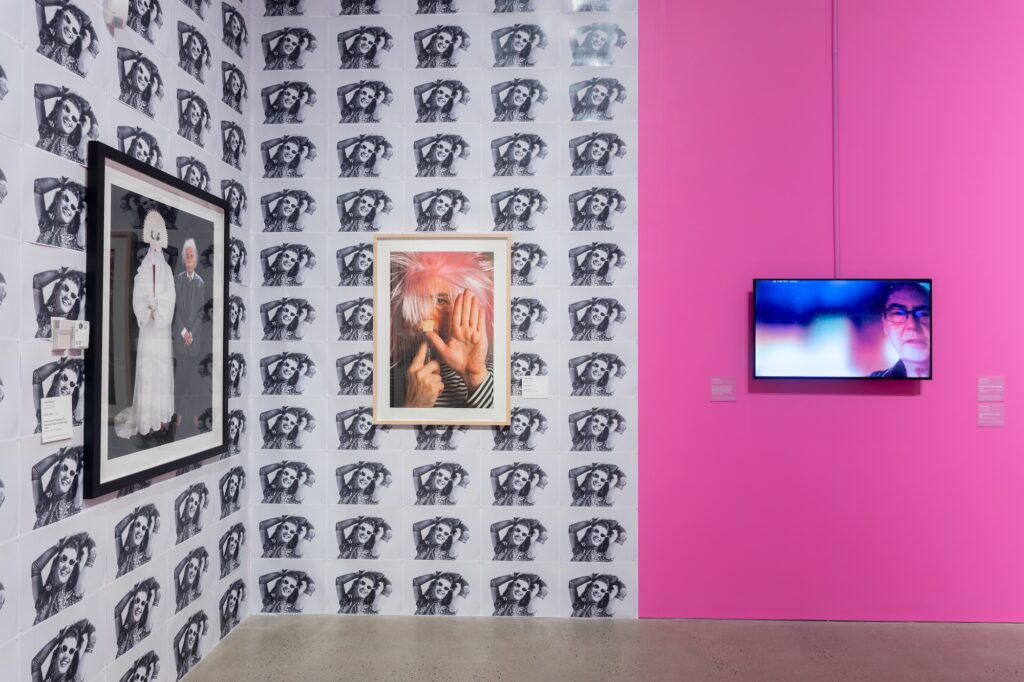
The interviews with Roberts, Artist Interviews: Pope Alice / Early Life / Alpha / Sexuality / Wunderkammer / Art (2023), are acoustically prominent in the exhibition, deemed so crucial that four copies play simultaneously across different screens in each corner of the room to cacophonous effect. We were surprised to hear death-fetishist Yukio Mishima mentioned in Sexuality, but the interviews are little more than stream-of-consciousness rambling, jumping from autobiographical details to mentioning something the artist once researched and onto vague conspiracies. Mishima and Saint Sebastian are name-dropped in relation to Roberts’ idea of his sexuality.
We asked Tsoutas whether the interviews were intended to mimic the style of Andy Warhol’s films, but Tsoutas denied that connection, instead clarifying that the intention was to present Robert’s words plainly because they were important. Yet Tsoutas’ claim about these interviews seems only to function to prime the audience to value them, and Roberts’ words in general, more than the content itself permits.
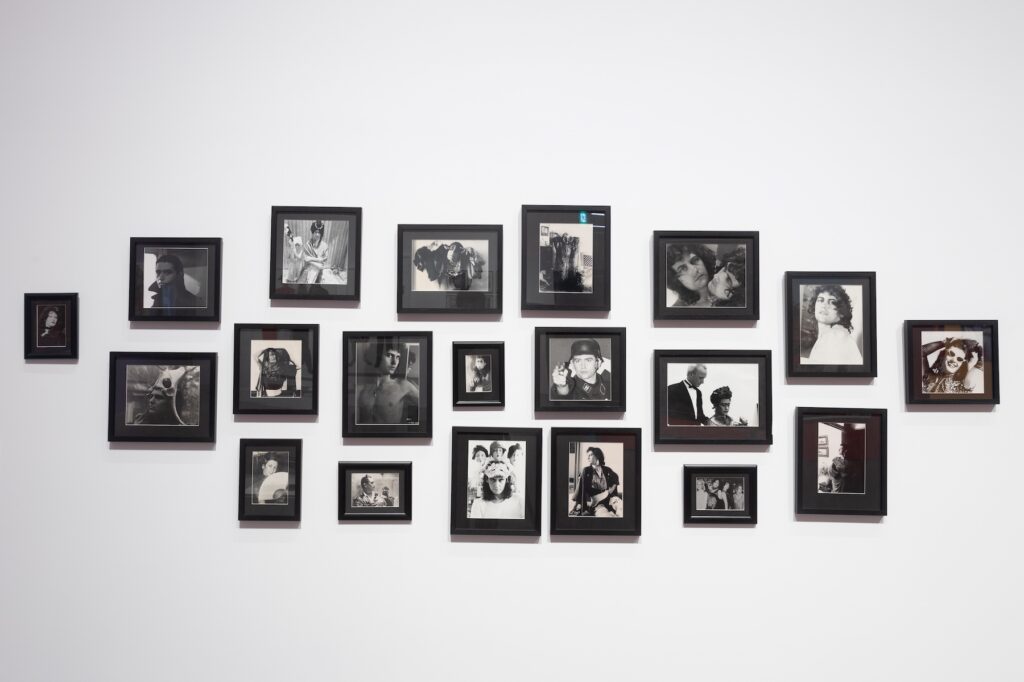
During an interview between Tsoutas and Roberts the day after the exhibition opening, an audience member asked Roberts about his use of gender in his work. Roberts lamented the (supposedly recent) politicisation of gender and shared his opinion that transgender children should not have access to healthcare. Denial of such healthcare is a form of conversion practice and opinions like this have resulted in the death of transfolk.9 We recognised these talking points from the hate group Alliance Defending Freedom and the Catholic Church.10 To hear the repetition of discourse that has resulted in the death of our people not only go unchallenged but defended and platformed in an exhibition framed as inclusive and a metaphor for liberation was another betrayal of some of the most marginalised members of the Queer community.
More disappointing were essays by further contributors to the catalogue. They claim that Roberts has good intentions, that he’s from a different time, or that We should consider his statements tangential to his art—a seemingly desperate deflection given how closely Roberts’ statements are bound to the art elsewhere in this exhibition. Each of the catalogue writers are experts in contemporary art or queer art history, but they were somehow unaware of or opted to avoid the trans history in which Roberts’ work is situated, such as Andy Warhol’s exploitation of Marsha P. Johnson.11
This exhibition showed us an art world that exploits the language of inclusivity for its own gain. This is an art world that views transfemininity as a momentary vehicle for shock and spectacle, but not something to be lived in; never to have grown up in. Through Roberts, the art world has crafted a standard-issue queer and sought indulgences in return. Luke Roberts: Beyond the Great Divide is a monument to that idol and leaves the rest of us outcast.
- Nicholas Tsoutas, “Beyond the Great Divide Curator’s Essay & Artist Interview,” in Luke Roberts: Beyond the Great Divide (Rockhampton Museum of Art, 2024). ↩︎
- Tsoutas. ↩︎
- Tsoutas. ↩︎
- Beautiful Darling, Documentary, 2010. ↩︎
- J. Gill-Peterson, A Short History of Trans Misogyny (Verso Books, 2024), 114. ↩︎
- Roz Kaveney and Rachel Pollack, “Don’t Call Me Mister You Fucking Beast,” in Come Together : The Years of Gay Liberation 1970-73, by Aubrey Walter (London: Gay Men’s Press, 1980). ↩︎
- “Imaginary Spears” in Black Witness, by Amy McQuire, 2024. ↩︎
- Tsoutas. ↩︎
- “The Shocking Rise of Deaths among Young Trans People,” Good Law Project (blog), June 21, 2024. ↩︎
- See: “Why Is Alliance Defending Freedom a Hate Group?,” Southern Poverty Law Center, accessed September 2, 2024.
Zinnia Jones, “The Far-Right Law Firm Alliance Defending Freedom Offered a Florida Anti-Trans Hate Group $15,000 to ‘Refute’ the WPATH Standards of Care ‘for Use in Litigation,’” Text, Gender Analysis (blog), May 17, 2023, World.
Mallory Moore, “Gender Ideology? Up Yours!,” Medium (blog), June 11, 2019. ↩︎ - “How Warhol Erased the Identity of His Black Trans Sitters,” Contemporary And, accessed August 20, 2024. ↩︎
Obscura @chelsea.obscura is a Plural photographer, wagakki musician, esotericist, and rogue scholar. She lives on Darumbal country.

